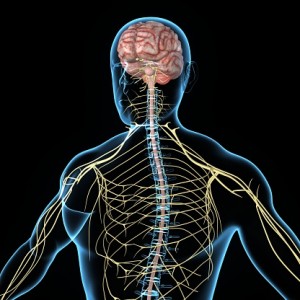Autonomic neuropathy in diabetic neuropathy, effect on hypoglycemia symptoms
 Autonomic neuropathy in diabetic neuropathy has an effect on hypoglycemia symptoms. Autonomic neuropathy is when the nerves that control bodily functions become damaged.
Autonomic neuropathy in diabetic neuropathy has an effect on hypoglycemia symptoms. Autonomic neuropathy is when the nerves that control bodily functions become damaged.
Blood pressure, temperature control, digestion, bladder function and sexual function can all be affected by autonomic neuropathy.
Normally, nerves send messages to the brain and other organs to ensure they function properly. Because autonomic neuropathy damages these nerves, signals cannot be properly sent, thus causing complications and loss of control.
The most common cause of autonomic neuropathy is diabetes but even infections have been shown to cause it. Medications, too, can contribute to autonomic neuropathy.
Diabetes, a major autonomic neuropathy risk factor
Diabetes is a major risk factor for autonomic neuropathy. In can cause damage to heart and blood vessels, the digestive system, the urinary tract, sex organs, sweat glands, eyes and lungs. When diabetes is poorly controlled it increases the risk of autonomic neuropathy and causes other nerve damage as well.
Being diabetic, overweight and having high cholesterol and high blood pressure increase the risk of autonomic neuropathy even more so.
Effect on autonomic neuropathy in diabetes and on hypoglycemia symptoms
Autonomic neuropathy has negative effects on hypoglycemia symptoms. Hypoglycemia is when blood sugar drops really low, causing shakiness, dizziness, headaches and even fainting. When blood sugar is low the body sends signal to restore it, but when a person has autonomic neuropathy these signal pathways are damaged, and thus the systems put into place to restore blood sugar do not function properly. Not only does blood sugar remain low, but symptoms that signal a person about their blood sugar are not present, causing greater consequences.
Signs and causes of autonomic neuropathy
The primary cause of autonomic neuropathy is diabetes, but there are other causes as well, including:
 Familial dysautonomia
Familial dysautonomia- Idiopathic orthostatic hypotension
- Multiple system atrophy with autonomic failure
- Parkinson’s syndrome with autonomic failure
Secondary causes of autonomic neuropathy are:
- Abnormal protein build-up
- Autoimmune neuropathies
- Carcinomatous autonomic neuropathy
- A decrease in function due to illness
- Pre-diabetes
- HIV
- Lyme disease
- Nutritional deficiencies
- Disorders caused by an immune response to cancer
- Physical trauma, pregnancy, surgery
- Enzyme disorder
- Toxicity
- Treatment with medicines, chemotherapy
Signs and symptoms of autonomic neuropathy are:
- Dizziness, fainting, weakness when changes positions – lying down to standing up
- Urinary dysfunction
- Sexual dysfunction
- Gastrointestinal dysfunction
- Impaired sweating
- Exercise intolerance
- Numbness or tingling of feet, hands and other body parts
Treatment and exercises for autonomic neuropathy
Treatment for autonomic neuropathy primarily involves treating the underlying cause. If diabetes is the cause of autonomic neuropathy, then controlling it can better treat the condition. In some cases, treatment of the underlying cause can help restore and repair damaged nerves over time.
 Other treatment methods are to improve daily life and manage specific symptoms. Managing symptoms can be done with the use of medication or lifestyle modifications. Specific symptom treatments may involve medications to ease gastrointestinal dysfunction, retraining your bladder for urinary dysfunction, physical therapy to improve exercise intolerance, medications for erectile dysfunction in men and stress-relieving techniques to combat stress and anxiety.
Other treatment methods are to improve daily life and manage specific symptoms. Managing symptoms can be done with the use of medication or lifestyle modifications. Specific symptom treatments may involve medications to ease gastrointestinal dysfunction, retraining your bladder for urinary dysfunction, physical therapy to improve exercise intolerance, medications for erectile dysfunction in men and stress-relieving techniques to combat stress and anxiety.
Specific exercises which can help with autonomic neuropathy include:
- Squeezing a pillow between your legs
- Squeezing a pillow with your arms
- Side leg lifts
- Front leg lifts
- Using a rowing machine
- Swimming
- Working your way up to walking and jogging
Lifestyle changes and home remedies for autonomic neuropathy
Lifestyle changes for autonomic neuropathy involve improving conditions related to autonomic neuropathy, such as blood pressure or vascular tone. Here are some lifestyle changes you can begin to make if you have autonomic neuropathy.
 Leg raising, toe crunching, and lower muscle contracting to increase blood pressure.
Leg raising, toe crunching, and lower muscle contracting to increase blood pressure.- Perform exercises to increase strength in the legs – this prevents blood from pooling in them.
- Drink plenty of water.
- Avoid large meals, which can increase blood pressure.
- Minimize caffeine intake.
- Keep your head elevated by six to 10 inches when sleeping to improve blood volume.
- Keep sodium intake to a minimum.
- Use custom elastic support stockings.
- Avoid alcohol.
- When performing postural changes perform them slowly.
- Control blood sugar.
- Properly manage autoimmune diseases.
- Stop smoking.
- Maintain a healthy weight and exercise.
- Prevent or control blood pressure.
Chronic neuropathic pain treatments for diabetes, cancer and MS may be possible
Researchers found that chronic neuropathic pain treatment may now be possible for diabetes, cancer and multiple sclerosis (MS). The findings were published in the Journal of Neuroscience and revealed the role of hyperpolarization-activated cyclic nucleotide-gated (HCN) channels, which control pain transmission signals to a particular area of the brain. Continue reading…
-
Weight Loss For Teenage Girls
The following article lists some simple, informative tips that will he
-
Simple Tips to Healthy Eating
Healthy eating has become one of the latest trends with many organi
-
3 Ways Your Hormones Are Sabotaging Your Slim-Down Plan
-
Finding Your Passion in Exercising
I know a college gymnast who does a lot
-
Build Weight Loss Success Through These Expert Tips
There’s tons of suggestions and articles on how to lose we
-
Getting rid of your abdominal fat the easy way
Lots of people carry a little bit excess weight around their belly are
- DON'T MISS
- Proven Truth about Cant Lose Weight Myth
- Find Your BMI - An Important Tool In Aiming For The Right Size
- Pure Acai Berry- Creation’s Pure Fat Burn Solution
- How Weight Loss Hypnosis Can Be Dangerous
- Natural Weight Loss Through Proper Nutrition
- Children Of Gastric Bypass Patients At Risk For Eating Disorders
- Downplay Your Urge For Food And Address Overindulging
- Lose Weight Really Fast - Keep It Safe And Simple
- How To Lose Weight, Quick Weight Loss Tips
- How to get rid of Fat Handles




